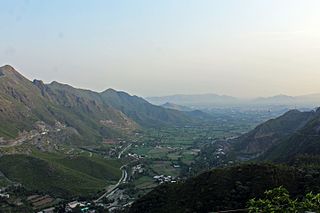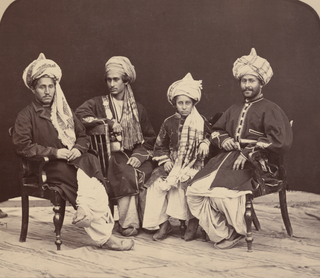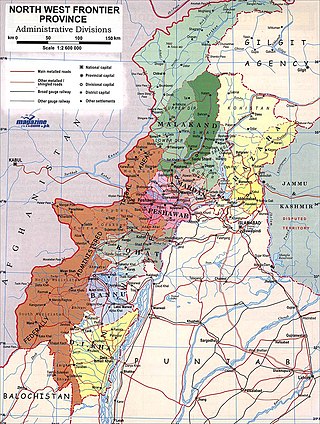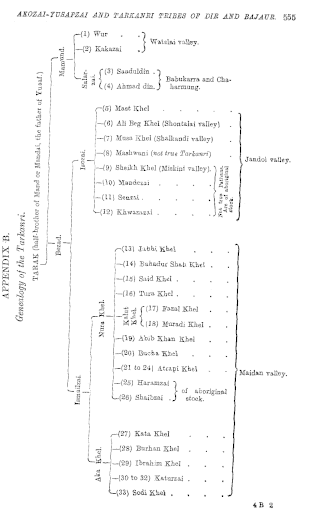
The Yusufzai or Yousafzai, also referred to as the Esapzai, or Yusufzai Afghans historically, are one of the largest tribes of Pashtuns. They are natively based in the northern part of Khyber Pakhtunkhwa, to which they migrated from Kabul during the 16th century, but they are also present in parts of Afghanistan, including Kunar, Kabul, Kandahar and Farah. Outside of these countries, they can be found in Ghoriwala District Bannu, Balochistan Sibi (Akazai), Chagai (Hassanzai) and Rohilkandh.

North Waziristan District is a district of Khyber Pakhtunkhwa province in Pakistan. It is the northern part of Waziristan, a mountainous region of northwest Pakistan, bordering Afghanistan and covering 4,707 square kilometres (1,817 sq mi). The capital city of North Waziristan is Miranshah.
Dargai is one of the tehsils of Malakand District in Pakistan's northwestern Khyber Pakhtunkhwa province. It located on the main highway from Peshawar to Swat, Dir and Chitral.

Orakzai District is a district in the Kohat Division of the Khyber Pakhtunkhwa province of Pakistan. Before 1973, it was part of FR Kohat. Up until 2018, it was an agency within the erstwhile Federally Administered Tribal Areas. However, with the merger of the FATA with Khyber Pakhtunkhwa, it attained the status of a district.

Malakand District is a district in the Malakand Division of the Khyber Pakhtunkhwa province of Pakistan.

Lal Pur is a district in eastern Nangarhar Province, Afghanistan, bordering Pakistan. Its population is primarily Pashtun and estimated to be 34,516 in 2002. The district center is the village of Lal Pur.

The Bettani, also spelled Batani, Baittani or Bhittani, is a Pashtun confederacy located mostly in Afghanistan and Pakistan. The Bettani are named after Shaykh Beṭ, their legendary ancestor, who is said to be the third and last son of Qais Abdur Rashid.

The Mullagori or Mulagori or Malagori is a Pashtun tribe present in Khyber District, tribal areas in Khyber Pakhtunkhwa, Pakistan. Historically, they are one of the smallest tribes of ethnic Pashtuns. They are considered as a sub-tribe of Momand Pashtun Ghoryakhel confederacy.
Khaglan Wala (ڪھگلانواله) is a village and union council of Isakhel Tehsil of Mianwali District in the Punjab province of Pakistan. It is part of Isa Khel Tehsil and is located at 32°37'60N 71°16'0E. Located on the northern bank of Kurram River. It is one of the villages situated on the western borders of Punjab province adjacent to KPK province. Its population is about 3000 people. This is comparatively a developed village. Basic facilities like electricity, telephone, metalled road, internet, schools, water supply system and sewerage system are provided to the inhabitants of this village. It is also a well-planned village situated on a 40 feet wide metalled road. A 30' wide main street runs east to west through the village, equally dividing the entire village into two parts. Three other streets run north to south crossing the main street at 90°. There are four mosques i.e Grand Mosque, Masjid Naurang Khel, Masjid Khizar Khel in Mohalla Khizar Khel and Masjid Abadi Tajpora in this settlement. The scene of river Kurram alongside bela jungle provides beautiful look to this historical village. Khaglanwala is hub of different routes coming from various villages situated on other side of the River Kurram, to reach Isa Khel city.
The Utmankhel is a Pashtun tribe present in Pakistan, with substantial numbers in Afghanistan. They lie between the Mohmands and the Ranizais of Swat, to the west and south-west of the junction of the Swat and Panjkora rivers. The Utmankhel mostly living in Malakand, Bajaur, Mohmand, Lower Dir, Mardan and Orakzai. The Utmankhel are Pashtuns, part of the Karlani tribal confederacy, who fought against British and Mughals emperors in Pakhtunkhwa. The British regarded the Utmankhel tribesmen as “warlike” peoples and one of the Martial Race. The Utmankhel are a tall, stout and fair race, but their dress and general customs have been assimilated by the neighboring peoples of Bajaur. Utmankhel speak the same dialect of Pashtu called Yousafzai Pashto.
Beka is a town and Union Council of Swabi District in the Khyber Pakhtunkhwa of Pakistan. It is part of Lahor Tehsil.
Bara Bandai is a village in Swat, Khyber Pakhtunkhwa, Pakistan, known as an area crossed by Alexander The Great during his invasion of the subcontinent. The people of village Bara Bandai belong to subsection Naikpikhel of Yusufzai the biggest and largest tribe of Pashtun or Pakhtun tribes. It is one of the Provincially Administered Tribal Areas (PATA) of Pakistan. The village contains a small series of mountains and a forest, residential area starting from meadows of mountainsand merge with river swat on right bank, a village market, vast land for crops, number of canals, and a part of the Swat river. Mountains of the village include Usmani Sar, Kafar Ghat and Najia Top.

The Malakand Agency was one of the agencies in the North West Frontier Province of British India and later of Pakistan until 2010. It included the princely states of Chitral, Dir and Swat, and an area around the Malakand Pass known as the Malakand Protected Area. The largest city in the area was Mingora, while the three state capitals were Chitral, Dir, and Saidu Sharif. In 1970, following the abolition of the princely states, the agency became the Malakand Division, which was divided into districts, one of which was the Malakand Protected Area, known as Malakand District. In 2000 the Malakand Division was abolished. Despite the constitutional changes since 1970, the expression Malakand Agency is still used, sometimes of the entire area of the former Agency, but more often of Malakand District.

Batkhela is a city, tehsil and the district headquarter of the Malakand District within the Khyber Pakhtunkhwa province of Pakistan. According to the 2017 Census of Pakistan, the population of Batkhela was recorded at 68,200. Batkhela is considered as one of the most popular business cities in the Khyber Pakhtunkhwa province. A water canal that pours into a small dam in the Jabban area near Batkhela is the main source of electricity production here.

The Kakazai, also known as Loi, Loe, or Loye Mamund, a division of the Mamund clan, are a Pashtun tribe part of the larger Tarkani tribe who are primarily settled in Bajaur Agency, Pakistan, but originally hailed from the Laghman province of Afghanistan. However, it has grown and scattered around to such an extent that it is recognized as tribe of its own.
Naikpikhel is a sub-clan of the Yousafzai Pashtun tribe in Swat, residing in the surrounding area of Tehsil Kabal, Swat, situated just opposite to Mingora on the western bank of the River Swat in Swat District, Khyber Pakhtunkhwa, Pakistan.
The Akakhel, pronounced Akaa Khel or Akakhail, are a Pashtun sub-tribe of the Ghilji/Ghilzais confederation. Their mother language is Pashto. In the early 20th century, the tribe was generally pastoral. The Akakhel are one of the largest Ghilji Pashtun subtribes. A reasonable majority of those who were living on the Durand Line migrated since 1800s into Khyber Pakhtunkhwa, Balochistan and Punjab provinces of Pakistan to Sikander Abad Charsadda,Peshawar,Swat(Barikot), Buner(Topdara), Abbottabad, Nowshera, Mardan, Attock, Rawalpindi, Islamabad, Gujranwala, Gojra, Faisalabad, Lahore, Multan, Hyderabad, Karachi and Quetta. The exact population number of this clan is not known; however, it is estimated to be around 2 million all around the world The population of this tribe primarily lives in Pakistan and Afghanistan. 85% live in Pakistan and about 1% or 2% live in Afghanistan and remaining 13% lives in England, Germany, United Arab Emirates, China, Malaysia, Canada and United States of America.

Alladand Dheri are two administrative units, known as Union council, of Malakand District in the Khyber Pakhtunkhwa province of Pakistan.
The British Baizai district is a bay about 20 miles long and 12 miles broad, which runs into the hills between the Paja and Malakand ranges at the extreme N.W. of the Yusufzai division of the Peshawur district. It is inhabited by Baizai, Swati, Utmankhel and Khattak, with some Mohmand, Rowanri, etc. The last of these claim to be Pathans, and there is no great family of khans in Baizai. On the fifth and 14 December 1849, Colonel Bradshaw led an expedition against those in British territory, in which he attacked and destroyed the villages of Sangao in British Baizai', and Palai Zormandai and Sherkhana in Swat Baizai. These operations were led against the Swatis, Ranizais and Uthmankhels of the Lundkhor tract. From the time of the annexation of the Punjab, the Swatis uniformly proved themselves bad neighbours to the British. They used the plains of Peshawar as hunting-grounds, as plunderers passed through Ranizai and plundered the plains of Hashnagar and Yusufzai. The Swatis harboured renegades, refugee criminals and internal malcontents, and took every opportunity of inciting British villages to violence.

Alladand Dheri is a village which consists of two union councils Alladand and Dheri respectively in the Swat Ranizai Tehsil of Malakand District of Pakistan. Alladand Dheri is situated in the mid of Malakand and is one of the well-known towns in Pashtun lands, known for its history, natural environment and hospitality. It is considered the oldest home of Yousufzai Tribe when they migrated from Afghanistan and settled in Alladand Dheri. The chief of Yousufzai tribe and founder of free Pakhtunkhwa state, Malak Ahmad baba made it capital of the new state. The Pashtun leader Malak Ahmad baba is buried in Alladand Dheri. People of Alladand Dheri are entirely Pashtun. Some important tribes that reside in the village are yousufzai (majority) shalmani, miagan and some non-pashtoon tribe. Alladand is fertile and is irrigated by River Swat. It shares a major part of supply of fruits and vegetables from Malakand District to whole Pakistan.











